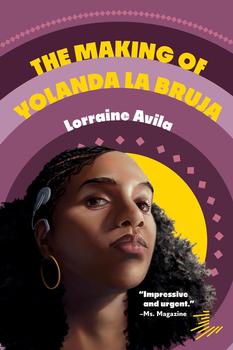Summary | Excerpt | Reviews | Beyond the Book | Read-Alikes | Genres & Themes | Author Bio

This article relates to The Making of Yolanda la Bruja
 In Lorraine Avila's The Making of Yolanda la Bruja, Yolanda's mother and grandmother guide her as she becomes fully absorbed in her family's traditional religious practices. While she's lighting candles, reading tarot cards and immersing herself in her grandmother's bath mixes, Yolanda's rituals celebrate her spirituality and bruja culture. What does it mean to be a bruja? The answer to that question has many layers, but some Latin American youth today are turning to brujería as a form of healing, cultural preservation and revolution against oppression.
In Lorraine Avila's The Making of Yolanda la Bruja, Yolanda's mother and grandmother guide her as she becomes fully absorbed in her family's traditional religious practices. While she's lighting candles, reading tarot cards and immersing herself in her grandmother's bath mixes, Yolanda's rituals celebrate her spirituality and bruja culture. What does it mean to be a bruja? The answer to that question has many layers, but some Latin American youth today are turning to brujería as a form of healing, cultural preservation and revolution against oppression.
The concepts of brujas and brujería — "witches" and "witchcraft" in Spanish, respectively — have existed for centuries. How people practice brujería varies as the term refers to multiple spiritual practices employed by cultures in the Caribbean, Africa and Latin America. The understructure of this diversity is informed by the African diaspora and Spanish colonialism. "There's so many different kinds of brujas," says NoNo, a practicing El Salvadoran bruja of Mayan descent who appears in a Vice article by Eda Yu. This is a widely shared sentiment, since systems of belief that incorporate bruja practices are often inherently culturally blended. For example, the Afro-Cuban religion Santería was built off of Yoruba, Indigenous and Roman Catholic traditions in response to Spanish colonization in the 15th and 16th centuries.
According to Yu, "the origins of contemporary brujería—especially as presented through its Afro-Latinx roots—can be most vividly understood through the development of spiritual practice in the face of the Spanish Inquisition and its colonial tribunal in Mexico." In an effort to preserve cultural integrity and adapt to oppressive forces, rituals associated with brujería have blended as they were passed down through generations.
But how does practicing brujería — an act of cultural unity, spirituality and perseverance — turn into an act of revolution? One answer to that involves the history of chocolate in Latin America.
Brian Alcamo explains in a post on the JP Linguistics blog that after Spanish colonization in Latin America, trade was one of the few ways women could maintain a sense of power and control in their lives: "Women suffered the most from violent religious extremism in the name of colonization, as they mingled in markets and often shared homemade remedies that traversed taboo racial boundaries as well as the boundaries of science and religion." One of these remedies was chocolate, valued for its "vitality-promoting properties." Long cultivated in the Americas, chocolate held special meaning in Indigenous communities. The power associated with ingesting it in beverage form, including sexual prowess, was both appealing and intimidating to the Spanish. In colonial Latin America, women preparing chocolate became a source of suspicion for men afraid of sorcery and witchcraft. In an article for Atlas Obscura, Reina Gattuso explains that colonial attempts to eradicate practices considered anti-Christian at this time often centered around chocolate, with men sometimes accusing women of serving them chocolate with magical properties.
According to Alcamo, "Nowadays, modern day brujas, brujos, and brujx are reclaiming the long-held taboo of the sexual enchantress and harnessing mysticism. Many are now publicly vocal about their power. Like their ancestors before them, young Latinx people are adopting brujeria to connect with their heritage, mysticism, and creativity." Emilia Ortiz, a Brooklyn bruja quoted by Yu, explains this phenomenon: "We're reclaiming our power, for far too long have we practiced in secrecy due to fear/society … Now though? It's our time. The same way other women/femmes are reclaiming their power in other areas—this is no different."
Depiction of a woman brewing chocolate in the Aztec document Codex Tudela (1530-1554)
Source: Museo de América
Filed under Places, Cultures & Identities
![]() This article relates to The Making of Yolanda la Bruja.
It first ran in the May 3, 2023
issue of BookBrowse Recommends.
This article relates to The Making of Yolanda la Bruja.
It first ran in the May 3, 2023
issue of BookBrowse Recommends.
Your guide toexceptional books
BookBrowse seeks out and recommends the best in contemporary fiction and nonfiction—books that not only engage and entertain but also deepen our understanding of ourselves and the world around us.